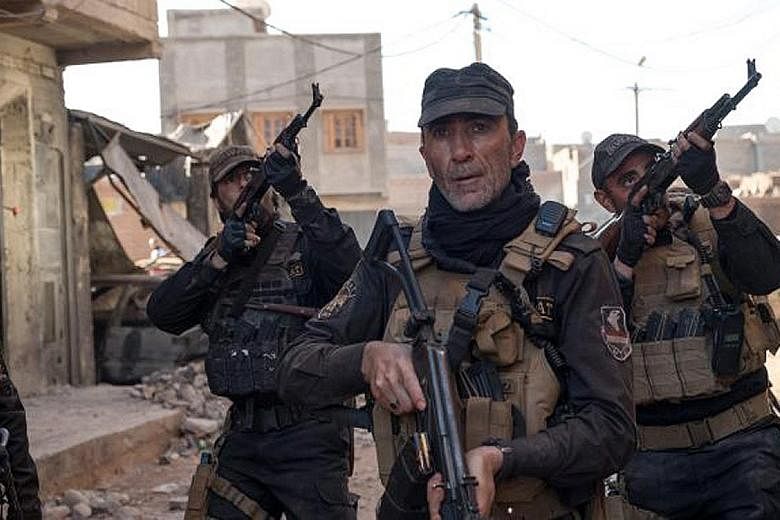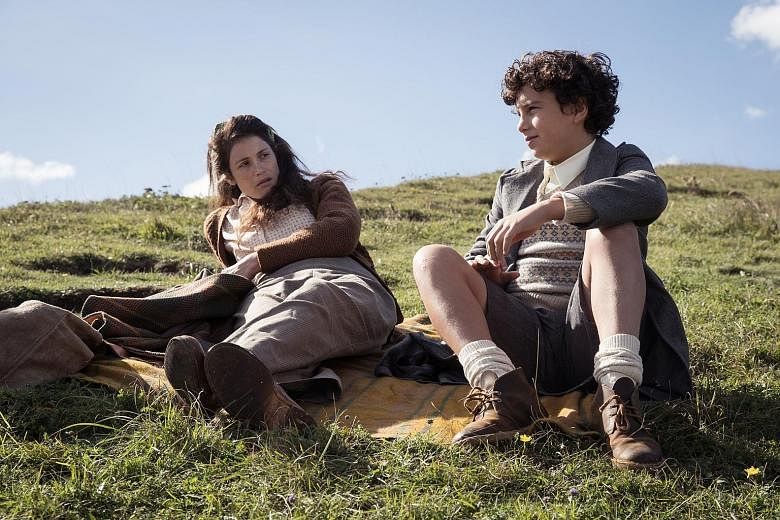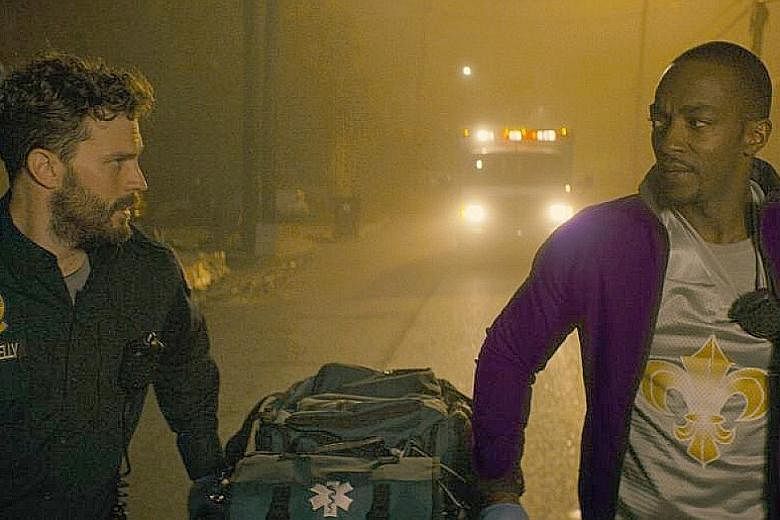MOSUL
(NC16, 101 minutes, opens today)
4 stars
A few years ago, an Iraqi special forces team roamed the country's second most populous city, Mosul, parts of which had fallen to the Islamic State in Iraq and Syria. Their extraordinary feats behind enemy lines - often acting beyond the control of the government - were captured in a 2017 New Yorker magazine article.
That piece has been adapted into a vivid, arresting movie, one that depicts soldiers not just doing their jobs, but doing it in a city in the grip of madness.
The story is seen through the eyes of fresh recruit Kawa (French-Tunisian actor Adam Bessa). Through him, the audience learns the ABCs: who the members of the Nineveh Swat team are and why they have chosen to make a stand when regular Iraqi troops have fled. Kawa's new buddies fight because the fight is personal. They are settling scores.
In a move rarely seen in commercial film-making, the largely American production team used a cast of actors of Middle Eastern or North African descent who speak Arabic. The military action is also realistic - in the heat of battle, for instance, good guys kill one another by mistake.
Because this is a story about renegades, and non-Americans at that, writer-director Matthew Carnahan is free to show the Swat team doing what the makers of, say, Black Hawk Down (2001) or American Sniper (2014) cannot. These fighters perform deeds that are, at best, morally ambiguous, at worst, could have them tried for war crimes.
Because Carnahan's fighters are driven by simple rage, the battle scenes are a cathartic watch, free of the groan-inducing higher-purpose, save-the-puppy motivations that fill out too many war movies.
The naive Kawa has a role similar to that of Emily Blunt's wide-eyed Agent Mercer in another movie in which the hands of the heroes are as blood-stained as those of the villains: the drug-war film Sicario (2015).
Rather than taking aim at how war without limits eats away at the soul, Mosul instead puts a focus on blood-pumping room-by-room, street-by-street battles. That focus, bolstered by big-budget set design, cinematography and editing, makes this one of the most exciting and interesting works of action cinema in recent months.
SUMMERLAND
(R21, 100 minutes, opens today)
2 stars
England is in the grip of World War II. Gemma Arterton is Alice Lamb, a loner who hides her cranky self in a cottage set on a cliff some distance from the village, where some think of her as a Nazi spy.
She is a writer, a published academic specialising in folklore - or to be more specific, a myth-buster, a Scrooge-like researcher obsessed with exposing traditional tales as comforting lies.
Alice will transform her thinking by the film's end, of course. The catalyst arrives in the form of a boy, Frank (Lucas Bond), one of the thousands of young evacuees sent from London to the country, away from German bombs. The town official, Sullivan (Tom Courtenay), forces him into Alice's care. The child and the child-hating recluse make each other miserable.
Getting from here to inevitable heart-warming resolution involves major discoveries and changes of heart.
There are plot contrivances here that ask a lot of the viewer, but none are sold with much conviction. Alice's grumpiness is more the result of a misunderstanding than actual malice on her part, for example.
The perky boy and the crusty academic find common ground with facile ease. The mid-film appearance of Vera (Gugu Mbatha-Raw), a figure from Alice's past, makes Alice's redemption all but assured.
British playwright and film-maker Jessica Swale wrote and directed this work, suffused with the sort of gentle humour and low-key tragedy that some might consider classic English comfort viewing, others as safe and forgettable.
Credit should be given to the film's distributor Shaw Organisation for keeping the lesbian kiss that earns this work an R21 classification, but otherwise there is little to recommend here.
SYNCHRONIC
(NC16, 102 minutes, opens today)
3 stars
In science-fiction movies, time travel is a tool used for wonderment, thrills and redemption. In 2017's The Endless, Justin Benson and Aaron Moorhead, working as co-directors (with Benson penning the screenplay), made time travel a source of horror. It was a festival hit.
As happens with those who break out at festivals, Benson and Moorhead were asked if they had anything similar in their bag and instead of casting themselves in the lead roles, they would get to cast stars.
Enter Jamie Dornan and Anthony Mackie, two New Orleans paramedics dealing with a new street drug of the film's title.
The first part of the movie concerns itself with scene-setting. Various persons swallow the drug and take a trip, literally.
These journeys often end in blood, because the past is not just a violent place, it is hostile to the sudden appearance of oddly dressed strangers.
Something happens to make the matter of the time-travelling pill a personal issue for the men. While it becomes immediately obvious what needs to be done to solve the problem, the characters take an awfully long time to arrive at the same conclusion.
There is a patience-testing amount of head-scratching before the men know what the audience already knows. When that happens the film finally quickens its pace, but that takes care of only some of the film's issues.
The villain in this drama is America's violent history. New Orleans in the Ice Age, or in the time of the Spanish conquest, or in the age of slavery or Civil War is not where tourists from the 21st century ought to make a stop.
In these scenes, there is a fine line between unintentional fish-out-of-water comedy and drama.
Benson and Moorhead barely hold the line here and use violence as the way out of that creative problem - thankfully, it works, most of the time.
SUMIKKOGURASHI
(G, 66 minutes, opens today, not reviewed)
The cute creatures that form the world created by designer Yuri Yokomizo, previously seen as motifs on products and as plush toys, now have a movie, one that was a box-office smash when released in Japan last year.
The characters are in their usual cafe when they find a magical book that transports them into the world of classic children's stories.




